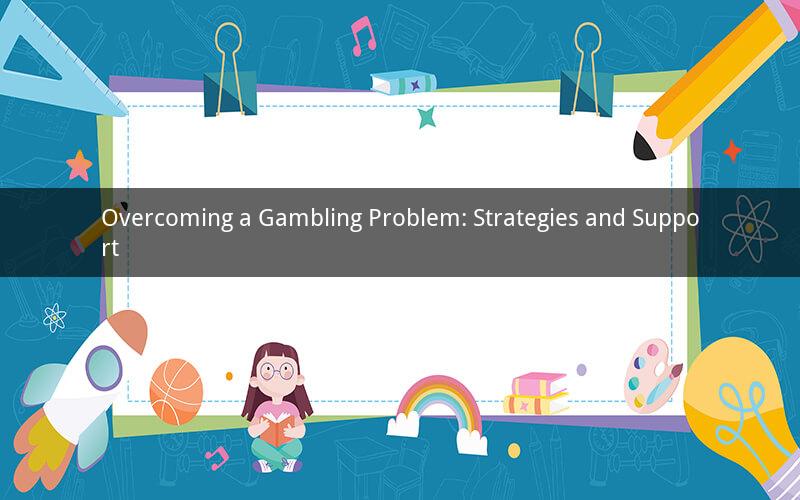
Introduction:
Gambling addiction is a complex issue that can lead to significant harm in various aspects of an individual's life. Whether it's due to financial difficulties, strained relationships, or emotional turmoil, it's crucial to understand how to overcome a gambling problem. This article delves into effective strategies and support systems to help individuals regain control over their lives and overcome their addiction.
1. Identify the Problem:
The first step in overcoming a gambling problem is to acknowledge and accept that there is an issue. It's essential to be honest with oneself and recognize the signs of problem gambling, such as spending excessive time and money on gambling activities, lying about gambling habits, or experiencing negative consequences due to gambling.
2. Seek Professional Help:
Professional help is vital in overcoming a gambling problem. Therapists specializing in addiction can provide personalized guidance and support. Cognitive-behavioral therapy (CBT) is often recommended, as it helps individuals identify and change the thoughts and behaviors that contribute to their addiction. Additionally, therapists may recommend medication or other treatments depending on individual needs.
3. Build a Support System:
Surrounding oneself with a strong support system is crucial for overcoming a gambling problem. This support system can include friends, family, support groups, or a combination of these. Sharing experiences with others who have faced similar challenges can provide encouragement and practical advice. Support groups like Gamblers Anonymous offer a safe space for individuals to share their struggles and receive guidance.
4. Develop Coping Skills:
One of the key components of overcoming a gambling problem is developing healthy coping skills. These skills can help individuals deal with cravings and negative emotions without resorting to gambling. Mindfulness and relaxation techniques, such as meditation, deep breathing exercises, and yoga, can be beneficial. Engaging in hobbies, exercising regularly, and pursuing other interests can also help fill the void left by gambling.
5. Create a Gambling-Free Environment:
Creating a gambling-free environment is essential to prevent triggers and temptation. This may involve removing gambling-related items from the home, avoiding places that encourage gambling, and disconnecting from online gambling platforms. It's crucial to establish boundaries and create a routine that supports recovery.
6. Financial Management:
Overcoming a gambling problem often requires addressing financial issues. Seeking help from a financial advisor or therapist specializing in addiction can assist in developing a budget and creating a plan to pay off debts. It's important to avoid using credit cards or taking out loans to fund gambling habits, as this can exacerbate financial difficulties.
7. Practice Self-Compassion:
Overcoming a gambling problem can be challenging, and setbacks are possible. Practicing self-compassion is crucial during this journey. It's important to forgive oneself for past mistakes and focus on progress rather than perfection. Celebrating small victories and acknowledging the effort put into recovery can provide motivation and resilience.
8. Stay Connected:
Staying connected with support systems and seeking help when needed is essential for long-term recovery. It's easy to feel isolated or discouraged, but maintaining connections with others who understand the struggles can provide a sense of belonging and support.
Questions and Answers:
1. How long does it take to overcome a gambling problem?
The duration of recovery varies for each individual. Some may experience immediate progress, while others may face challenges and setbacks along the way. It's important to focus on the journey rather than the timeline.
2. Can someone overcome a gambling problem on their own?
While it is possible for some individuals to overcome a gambling problem independently, seeking professional help and building a support system can significantly enhance the recovery process. Professional guidance and support from others can provide valuable tools and resources.
3. Are there medications available to treat gambling addiction?
Medications may be prescribed in some cases to help manage symptoms of gambling addiction, such as depression or anxiety. However, there is no medication specifically designed to cure gambling addiction. Treatment often involves a combination of therapy, support, and lifestyle changes.
4. Can family members or friends help in overcoming a gambling problem?
Yes, family members and friends can play a crucial role in supporting someone's recovery. They can offer emotional support, encourage participation in treatment programs, and help create a gambling-free environment. It's important for family and friends to educate themselves about gambling addiction and seek support for their own well-being during this process.
5. What can be done if a person relapses after overcoming a gambling problem?
Relapse is a common part of the recovery process. If a person relapses, it's essential to view it as a learning opportunity rather than a failure. It's important to reassess the treatment plan, seek professional help, and reconnect with support systems. Remembering the progress made in the past and focusing on the future can help overcome setbacks and continue the journey towards recovery.